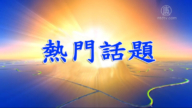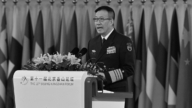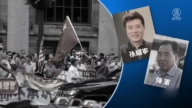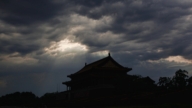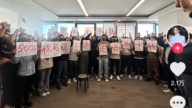【新唐人2013年11月16日訊】中共新政信誓旦旦的改革,隨著三中全會的閉幕,最終以堅持公有制為主體的老路畫上了句號。最新消息傳出,為了防止中共立即崩潰,在會議期間,中共領導人習、李不得不放棄先前的主張,來保住中共政權。外界指出,30多年前,雙軌制的經濟改革帶來的經濟形勢好轉,支撐了中共的繼續執政,不過從現在跛足的改革來看,原來的老路已經走不通了。
近幾個月來,中共總理李克強一再宣稱,要壯士斷腕深化改革,三中全會前夕,習近平也宣稱不再摸石頭過河,要進行一場「範圍和力度空前的全方位改革」。
而中共三中全會《公報》聲稱,全面深化改革,必須高舉所謂中國特色社會主義的旗幟,以所謂馬克思列寧主義為指導,「以公有制為主體」。
中國經濟學家茅于軾:「世界上成功的沒有一個是公有制的,公有制為主的全都失敗了,包括中國,中國成功不是因為堅持公有制,因為引進了私有制,所以把公有認為是我們成功的原因,是整個看錯問題了。」
《美國之音》評論說,中國公眾對中共宣傳了30多年的「改革」已經感到十分恐懼,甚至十分憎惡。
所謂公有制經濟,定義上,是生產資料歸全體人民群眾所有。而當今的中國,中共權貴將國有企業當成了自己的搖錢樹。前中共黨魁江澤民家族控制了中國電信行業,曾慶紅、周永康家族控制了石油能源,李鵬家族控制了電力行業。隱藏較深的還有,劉雲山的兒子是著名的金融大亨,李長春家族則掌控了部分文化基金。
三中全會前夕,「中石油」和「中石化」公司雙雙發佈了2013年三季報,聲稱前面三個季節實現淨利1469億元,每天能賺5.38億元。
中國經濟學家茅于軾告訴《新唐人》,國有企業全面處於虧損狀態,每年僅僅向國家上繳10%的利潤,還叫苦連天,
北京天則經濟研究所的研究報告顯示,2001年至2009年,國有及國有控股企業,平均淨資產收益率為8.16%,如果扣除各種補貼,平均的真實淨資產收益率為-6.29%。
北京天則經濟研究所所長盛洪在香港媒體的專訪中表示,國企是自由企業制度的破壞者。盛洪拿鐵道部舉例說,鐵道部表面是行政部門它壟斷的同時,還可以利用行政權力獲得很多政府資源﹔在瘋狂投資的同時,編出一些故事,上很多項目,而他們要求的金錢數額,又遠遠高出這些項目實際需要的費用,於是他們拿著剩餘的錢,做所謂的第三產業投資。
大陸反腐記者王克勤:「按道理來講,在座的都應該是國有企業的所有人,都是股東,既然是股東,請問你有沒有行使過自己財產的股份權,有沒有行使過自己資產的收益權,你連知情權都沒有,我們的權利全被代表了,這就是公有制最可怕的地方。」
大陸反腐調查記者王克勤在大學講課時說,正因為公有制,才出現官員利用職權強拆佔農民土地,農民卻沒有辦法,也正因為公有制,才會造成國有企業幾十個億、上百億的財產,被省長或市長的小舅子用幾千萬收買。
中國的石油由「中石油」、「中石化」兩家國有企業壟斷,天則經濟研究所今年發佈的一份報告中顯示,按照稅前的價格做比較,同等品質的成品油,中國的價格,比國際上幾個主要國家的平均價格要高出31%。
而中共的國有資產,來源於中共第一次經濟改革,當年中共通過血腥的方式,打土豪分田地,以及公私合營等,把地主資本家的財產,繳為所謂國有,再通過剝削中國人民的廉價勞動力,用一個國家的力量把這些企業擴大,如今落入中共寡頭私人腰包。
採訪編輯/劉惠 後製/周天
Desperate to Survive: CCP Keeps Tight Grip on Public Ownership
The CPC new promised deal’s reformation made the decision at
the Third Plenary Session closing.
It has to uphold the old system of common
ownership as the mainstay.
The Latest news said that Chinese leaders Xi Jinping and Li
Keqiang had to give up the previous proposition to keep the
regime and prevent the CCP’s immediate collapse.
Outsiders pointed out that dual track economic reform had
improved the economic situation and supported the
CCP’s ruling for over 30 years.
But now, the old system has reached a dead end
with lame reform.
In recent months, the Chinese Premier Li Keqiang repeatedly
claimed to deepen the reforms in China and
“cut losses quickly".
On the eve of the Third Plenum, Xi Jinping also claimed to
carry out a full range reform with an unprecedented scope and
strength without “touching the stone across the river".
The “Communique" of the Third Plenary Session of the CPC
claimed that to comprehensively deepen reform,
we must hold high the great banner of socialism
with the Chinese characteristics in guidance
of Marxism-Leninism, using the
mainstay as common ownership.
Chinese economist Mao Yushi: No country with public
ownership has been successful including China.
China’s success is not because of common ownership but the
introduction of private ownership.
So it’s totally wrong to claim common ownership
as the reason of success.
“Voice of America" commented that the Chinese public felt
very scared and even hate the
CCP’s over 30 years’ reform propaganda.
The so-called public sector definition is the means of
production owned by the whole people.
And today’s China, the CCP’s dignitaries made the state
owned enterprises as their money spinner.
Former CCP leader Jiang Zemin’s family control the Chinese
telecommunications industry, Zeng Qinghong and Zhou
Yongkangs’ families control the oil and energy; Li Peng’s
family control the power sector.
Things deeply hidden are Liu Yunshan’s son is a famous
financial tycoon; Li Changchun’s family then took partial
control of of the Cultural Fund.
On the eve of the Third Plenum, “PetroChina" and “Sinopec"
both released their third quarterly report for 2013, claiming
that the previous three seasons’ net profit are 146.9 billion
yuan which means 538 million yuan net profit each day.
Chinese economist Mao Yushi told New Tang Dynasty that
state owned enterprises operated totally at a loss and felt
the pinch by paying to the state only 10% of
the profits each year.
The study report of “Beijing Tianze Economic Research
Institute" shows that from 2001 to 2009, the average net
assets of state-owned and state holding enterprises is 8.16%;
the real average net assets is -6.29% without
all of the subsidies.
“Beijing Tianze Economic Research Institute" director Sheng
Hong said to the Hong Kong Media, state-owned enterprises
is the destroyer of the free enterprise system.
For example, the Ministry of Railways is an executive branch
apparently, it can not only monopolize the business but also
obtain many government resources
through administrative powers.
Other than crazy investing, they also compiled some stories
on many projects, which required much more money than the
actual costs for these projects.
So they took the remaining money to do the so-called
third industrial investment.
China anti-corruption reporter Wang Keqin: Logically
speaking, you are all the owners of state-owned enterprises.
Since you are shareholders, do you have shareholders right
and the usufruct right?
You don’t even have the right to know and
all of our rights have been representative.
That’s the most horrible thing of common ownership.
China anti-corruption investigative reporter Wang Keqin talked
in his university’s lectures that farmers can do nothing on
officials’ demolition of their land because
of common ownership.
Common ownership also resulted in the governor or
mayor’s brother in law buying state-owned enterprises’ several
billions worth of property with just tens of millions.
China’s oil is monopolized by “PetroChina" and “Sinopec"
two state-owned enterprises.
“Beijing Tianze Economic Research Institute” released a report
showing that the pre-tax price of the same quality refined oil
in China is 31% higher than the average price in
several major countries.
The CCP’s state-owned assets were from the first economic
reforms of the CCP through the bloody way of expropriating
the local tyrants and distributing land , as well as
joint state-private ownership, etc.,
They captured the property of the landlords and capitalists as
so-called state-owned.
They expanded these state-owned enterprises with the strength
of a country by the exploitation of cheap Chinese labor.
Lastly, these properties fell into private pockets
of the CPC oligarchs.
Interview & Edit/LiuHui Post-Production/ZhouTian




